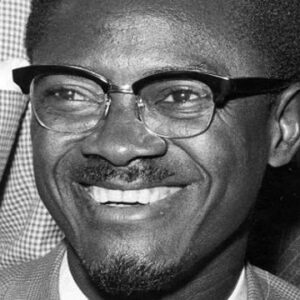Patrice Lumumba was the Republic of Congo’s first democratically elected Prime Minister. He was a Congolese independence leader who created the mainstream Mouvement national congolais (MNC) party and was instrumental in the country’s fight for independence from Belgium. Before entering politics, he worked as a writer and civic organizer. He was a member of the Batetela ethnic group, and was born into a farmer’s family in Belgian Congo. He began working as a postal clerk and a traveling beer salesman after completing his education. He eventually became interested in politics and joined the Belgian Liberal Party, where he was largely responsible for the distribution of party literature. His political activism grew in intensity over time, and he helped create the broad-based Mouvement national congolais (MNC) and ultimately became its president. Despite the fact that he was from a minor ethnic group, he was able to establish himself as a popular politician despite the fact that his political opponents were from powerful and vast ethnic groups. He was a fervent nationalist who fought for Congo’s independence from Belgium and rose to prominence in the Congo’s independence struggle. In June 1960, he became the country’s first democratically elected Prime Minister. His administration, however, did not endure long, and he was assassinated in 1961, ending his political career abruptly.
Childhood and Adolescence
Patrice Lumumba was born on July 2, 1925, in Katakokombe, Belgian Congo, to François Tolenga Otetshima and Julienne Wamato Lomendja as Élias Okit’Asombo. His father was a farmer, and he grew up on a farm. He was the youngest of three brothers and a half-brother.
He acquired his primary education at a Catholic missionary school before transferring to a government post office training school, where he excelled in the one-year program.
During his school years, he began writing pieces for publications and became interested in political activism.
Career of Patric
He began his job as a mail clerk in Léopoldville (now Kinshasa) and transferred to Stanleyville shortly thereafter (now Kisangani). He also supplemented his income by selling beer on the road.
He eventually worked as a post office accountant. Throughout this time, he remained active in the Congolese press, contributing articles on political problems on a regular basis.
Lumumba joined the Liberal Party of Belgium in 1955 after becoming regional president of the Cercles of Stanleyville. He spent much of his time editing and disseminating party publications.
In 1955, he was on a study tour in Belgium when he was caught and sentenced to two years in prison for embezzlement. In July 1956, his sentence was shortened to twelve months and he was released.
Following his release, he became increasingly interested in politics, and in 1958, he helped to create the broad-based Mouvement national congolais (MNC). Later, he was elected president of the organization.
He represented the MNC in the All-African Peoples’ Conference in Accra, Ghana, in December 1958, accompanied by a team, where Lumumba solidified his Pan-Africanist convictions.
The country’s nationalist fervor grew, and Congolese citizens began demanding complete independence from the Belgian authorities. In December 1959, local elections were held, with the MNC winning a resounding victory. Congolese independence was declared on January 27, 1960, with the date of independence scheduled for June 30, 1960.
In May 1960, the MNC won national elections and hence the power to establish a government. Congo’s first Prime Minister, Patrice Lumumba, and President, Joseph Kasa-Vubu, were elected on June 23, 1960. The new government received a vote of confidence on June 24, and the Congolese Chamber and Senate ratified it.
Even as the residents of the country celebrated their newfound independence, Lumumba made a disastrous decision: he chose to boost the salary of all government personnel except the army. As a result, some soldiers rebelled, and the rebellions swiftly spread across the country, resulting in a general breakdown of law and order.
It was a turbulent period in Congo, characterised by political upheaval and extensive bloodshed, which resulted in the government’s weakening. Lumumba protested in reprisal when the President fired him from the government in September.
Colonel Joseph Mobutu, assisted by Belgian forces, staged a coup d’état and deposed both Lumumba and President Kasa-Vubu, taking advantage of the circumstances. Lumumba attempted to flee but was apprehended by Katangan and Belgian officers and tortured.
Major Projects of Patrice
Patrice Lumumba was just the Congo’s Prime Minister for 81 days, yet he made an everlasting effect on Africa’s contemporary political history. He was a strong-willed, principled guy who lived and died for the values he believed in. He was a supporter of pan-Africanism and the liberation of colonial lands.
Personal History and Legacy
He married Pauline Opangu in 1951. Patrice Lumumba and his wife had five children, the youngest of whom was born six months after Patrice Lumumba died.
Lumumba, along with a few other ministers from his newly created independent government, were arrested and tortured by Katangan authorities after his government was toppled in a coup during the Congo Crisis. On January 17, 1961, the men were lined up against a tree and shot one by one.
Estimated Net Worth
Patrice is one of the wealthiest World Leaders and one of the most loved. Patrice Lumumba’s net worth is estimated to be $1.5 million, according to Wikipedia, Forbes, and Business Insider.


